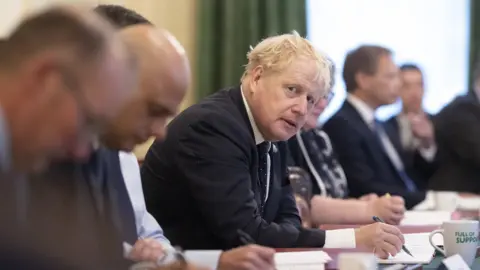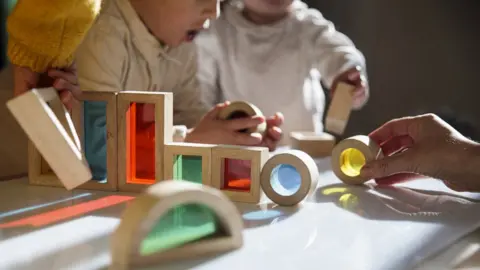Cost of living crisis: Changes to childcare and MOT rules considered to help budgets
 No 10
No 10Ministers have pitched ideas to tackle the cost of living, as record inflation pushes up food and energy prices.
Boris Johnson called for proposals from his team - that do not rely on spending taxpayers' money - during Tuesday's cabinet meeting.
The BBC has learned that the PM said he wanted to reduce childcare costs by easing health and safety rules.
And sources said Transport Secretary Grant Shapps suggested relaxing the frequency of MOTs.
Delays at the Passport Office were also raised, with Mr Johnson threatening to privatise the service if it did not start delivering better value for money.
Opposition parties have said the help on offer from the government to tackle rising living costs was insufficient, with Labour, the SNP and the Liberal Democrats calling for an emergency Budget to give more support to households.
With inflation at a 30-year high and household bills continuing to rise, No 10 says the PM has asked ministers to come up with "innovative ways" to ease living costs.
One of the proposals came from the PM himself, with sources saying he wanted to lower the legal limits on adult supervision for children in England, as part of a drive to reduce living costs.
A source in the meeting said Mr Johnson had joked about knowing about the high cost of childcare - he has fathered at least seven children - before telling ministers the government had to get on with reducing costs.
'Cutting corners'
Current legal requirements in England say there must be at least one member of staff for every three children in groups aged two years and under.
For two-year-olds and over, there must be one member of staff for every four children.
The Liberal Democrat and Conservative coalition government attempted to relax child-to-staff ratios in England as part of a package of reforms in 2013.
But the plans - spearheaded by then-education minister Liz Truss - were abandoned after they were opposed by Nick Clegg, who was deputy prime minister at the time.
Earlier this month, experts warned the government against relaxing nursery staffing rules as ministers reviewed ways to improve the cost, choice and availability of childcare.
Labour's shadow education secretary Bridget Phillipson said the proposal would "drive down quality whilst making no difference to availability".
And Lib Dem education spokesperson Munira Wilson said Mr Johnson has chosen to "cut corners and endanger our children", instead of addressing this issue "head on".
 Getty Images
Getty ImagesAnother proposal presented to cabinet came from Mr Shapps, who suggested reducing the need for an annual MOT.
Every vehicle that is three-years-old or over must have a current MOT test certificate and drivers must renew this once a year, costing up to £54.85 for a car and £29.65 for a standard motorcycle.
Two cabinet sources told the BBC that Mr Shapps suggested reducing the need for renewal to every two years, rather than one, to cut costs for households.
Motoring organisation the AA has come out against the idea, arguing it could in fact make costs worse for drivers due to higher repair bills, as well as reducing road safety.
The prime minister's official spokesman said Chancellor Rishi Sunak "underlined the importance" of not fuelling further inflation during the cabinet meeting, and that departmental budgets "are set" with no plans to currently go beyond these limits.
But Lib Dem leader Sir Ed Davey said the meeting showed the PM was "completely out of ideas during the most profound crisis in decades".
He added: "Whilst families are facing sky rocketing bills and soaring inflation, Boris Johnson's answer is another quiz night at No 10."
Sir Ed echoed Labour and the SNP's call for an emergency budget, including a cut in VAT, and backed opposition plans for a windfall tax on the profits of the oil and gas companies.


What is striking about some of the proposals ministers have pitched to ease the cost of living is they don't require any cash to be spent.
Instead, they involve cutting rules and regulations.
This marks a significant political shift.
For the past two years, the government has intervened with financial support on a number of fronts to help households and businesses through the pandemic.
Ministers are concerned about the government debt that has accrued, and are now looking for ways to help people with rising bills without necessarily having to spend more cash.
Some government sources say ministers want less regulation and intervention from the state in people's lives - a more traditional Conservative approach, with ministers also looking at what "red tape" they can cut post-Brexit.
But this change of tune has caused a backlash from government critics.
Opposition parties have accused them of sacrificing health and safety regulations and "endangering" people in the process.
And others say cutting rules and regulations won't go far enough to helping people with spiralling bills now.

It comes as Labour has warned of a £10bn hike in annual petrol and diesel costs, with "soaring" prices putting the squeeze on household budgets.
"Labour's plan would help households through this crisis with up to £600 cut off energy bills, funded by a one-off windfall tax on the booming profits of oil and gas producers," said Labour's shadow secretary of state for transport, Louise Haigh.
The SNP called for an emergency budget earlier this month, saying the Tories had ignored the cost-of-living crisis.
The Green Party has also accused the government of failing voters on living costs, and campaigned for insulation projects to reduce energy needs and keep homes warm.
